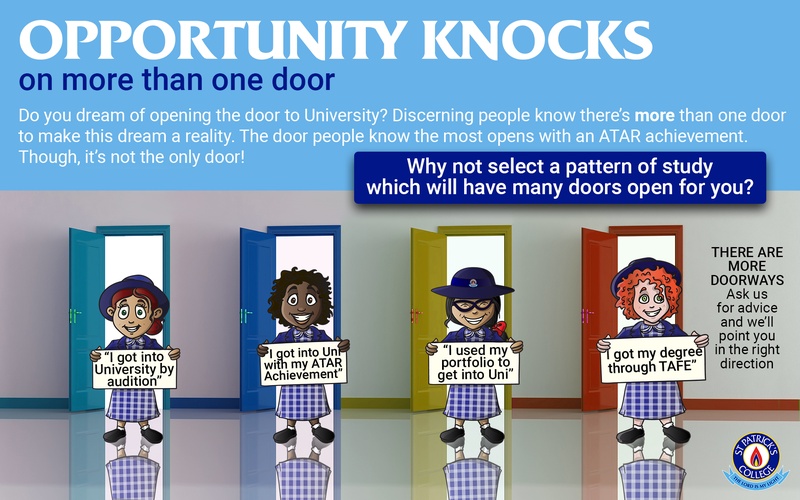Year 10 Subject Selection for 2022-2023
This week, Year 10 commenced a very exciting stage in their education where they were asked to make important decisions about the subjects they choose for 2022 and 2023. Because this is the start of their HSC journey, it is also time for Year 10 students to consider long-term goals around career aspirations.

Year 10 students are asked to select a program of study that is going to realise their long-term goals. The College is accredited to offer courses developed by the NSW Education Standards Authority (NESA) as well as Vocational Education and Training (VET) curriculum frameworks. The College also has programs where students can combine NESA, Technical and Further Education (TAFE) and paid work through a school-based apprenticeship or traineeship. The workforce of the future will require a range of skills and people with different types of qualifications. Year 10 students are encouraged to pursue excellence and follow their passions and interests when selecting their subjects for Years 11 and 12.
Stage 6 is typically a two-year program of study in Years 11 and 12 where students complete a Preliminary and HSC Course in each subject they study. At St Patrick’s College, the Preliminary courses are taught in the first three terms of Year 11 and the HSC courses commence in Term 4 of Year 11. The various accrediting authorities (NESA, VET and Universities) have rules and requirements associated with various study programs. A booklet has been prepared to support students and families navigate the subject selection process.
It is impossible for Year 10 students to know exactly what they are going to do with the rest of their life, but they should have some ideas about what they are interested in. At this stage, Year 10 students should know what their options are and what they need to do to pursue those options. University is a good option for many students, however, it is not the only way. There are excellent colleges that offer very good courses and students are encouraged to thoroughly research options available.
There are many professions where an undergraduate degree is required, and a commonly travelled pathway involves an application through the University Admissions Centre (UAC) which calculates an Australian Tertiary Admissions Rank (ATAR) for each student. Universities set an ATAR cut-off for various courses and then offer students, who meet the minimum ATAR, a place in a course at their institutions.
The ATAR is not the only pathway to university. An increasing number of students are using the Certificate IV at TAFE as an entry to University or study undergraduate degrees at TAFE. Some courses offer Portfolio Entry and various University Preparation Programs are another avenue. It is important that students thoroughly research all options available.
Students must begin their research by establishing career goals. They can change their mind, but it is important to know what they want and be committed to doing whatever it takes to get there.
A career aim:
- Gives a sense of certainty about the future.
- Relieves the pressure of thinking about what they are going to do.
- Allows students to make future plans.
- Provides a target score to aim at.
Mr Williams, the Careers Advisor, is supporting students in their research of career options. There are a number of websites designed for young people that have careers and pathways information. In addition, most institutions offer information sessions for school students.
The Stage 6 Course Application Process begins now:
- Term 2 Week 2 - Students are issued with their course selection booklet and the course selection process is presented.
- Term 2 Week 3 - Students complete a course selection survey to submit expressions of interest in particular Year 11 courses. Together with student achievement data, this provides a starting point for academic counselling sessions later in the term.
- Term 2 Week 5 - Course selection talks provide opportunities for students to attend information sessions and speak with teachers about course selection.
- Term 2 Week 7 - 2022 Year 11 Course Information Evening for students, parents and carers. This event provides additional information about HSC and ATAR eligibility requirements and the College Course Application Process. Families have the opportunity to ask questions about course content, expectations and programs of study.
- In Week 7, the formal Course Application Process begins.
- T2 Week 9 to 10 - Year 10 students participate in one-on-one academic counselling sessions. Their career and post-school study aspirations are discussed, and course preferences are reviewed and finalised. Students and parents/carers endorse course choices by signing the course selection forms.
- Early Term 3 - Students receive a confirmation of acceptance and the official notification of courses they have been placed into for their 2022 Year 11 Preliminary courses.
A website (microsite) is in preparation to support Year 10 students – careers.saintpatricks.nsw.edu.au. It is updated regularly and has links to important information related to subject selection and careers.
It is natural for students and families to have questions about subject selection. Questions related to subject content and expectations can be directed to KLA Coordinators. Their details are in the Preliminary and HSC Course Selection Guidelines issued to students this week.
Non-KLA contacts related to the Course Application Process:
|
Assistant Principal, Learning and Teaching |
Dr Debra Bourne |
|
Careers Advisor |
Mr Damien Williams |
|
Learning Enhancement Coordinator |
Mrs Eileen Kelly |
We wish Year 10 students and their families every blessing as they start on their HSC journey.
Debra Bourne - Assistant Principal Learning and Teaching